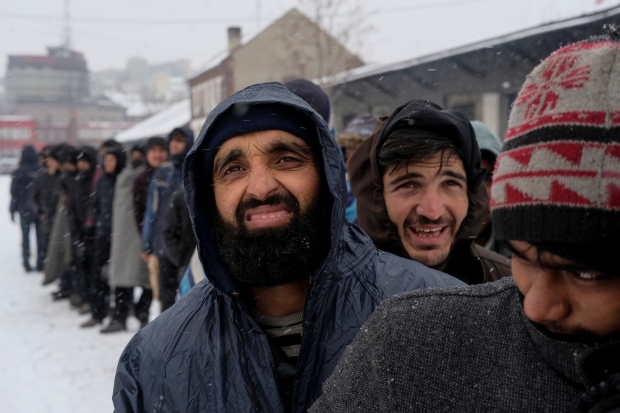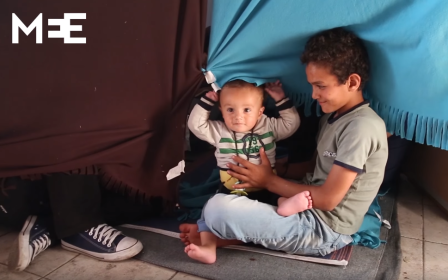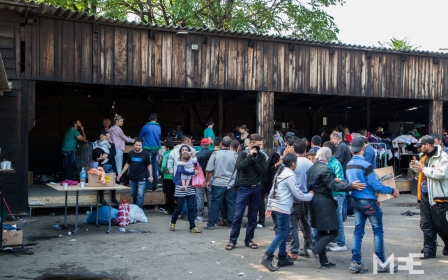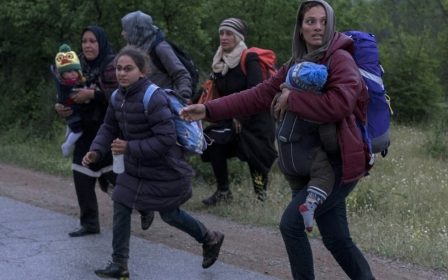Refugee winter crisis: Serbia accused of illegal mass deportations
BELGRADE - Humanitarian organisations have accused Serbia of forcing hundreds of refugees back towards Macedonia and Bulgaria, refusing them help in freezing temperatures and breaking international law.
Nikola Kovacevic, of the Belgrade Centre for Human Rights, said his group had multiple complaints of so-called "pushback" campaigns against refugees, many of whom are from Syria and Iraq, to get them out of Serbia.
Complainants say they have been bussed to the border, had their papers confiscated and left in sub-zero temperatures, forcing them to cross into neighbouring countries to find help. One Syrian family stated that their official asylum seeker papers were torn up in their faces as they were ushered towards the border.
The assessment is that a total of 700-1,000 refugees were illegally deported to Macedonia and Bulgaria since September - Nikola Kovacevic
Police and the army have been accused of complicity, but Kovacevic said it was difficult to know exactly who was involved in specific incidents as border forces are a combination of army and police.
"Our colleagues on the field received about 20 complaints from refugees about illegal mass deportations. The assessment is that a total of 700-1,000 refugees were illegally deported to Macedonia and Bulgaria since September," he told Middle East Eye.
"Colleagues from the Macedonian Young Lawyers Association separately reported that somewhere between 400 and 600 people were deported there."
Kovacevic said the government could be sanctioned for the "pushbacks," which are illegal according to Serbian law and international law guaranteeing safety until official asylum seeker applications have been determined.
Family dumped in the snow
He said: "One case involved a Syrian family of seven with asylum seeker papers and instructions to go to a refugee camp in Bosilgrad, near the Bulgarian border. Instead they were taken out of their bus on 17 December which was going from Belgrade to the camp.
"A uniformed unit took them out of the bus and on to the border. They had their papers torn up and were left in -11C in the middle of a forest."
Irena Vari, a worker for the humanitarian group InfoPark, told MEE that she was called by the family, the al-Rahims, after they had been dumped.
“They contacted me with a mobile phone. They had a two-year-child with them. We found them by using GPS, and with the help of local police," Vari said.
Kovasevic said the family would make a complaint to the Serbian Constitutional Court, and were prepared to complain to the European Court in Strasbourg.
Human Rights Watch said it had reports of similar deportations. The group has not conducted in-depth investigations but has spoken to asylum seeker and migrant victims of "pushback" campaigns.
“It is particularly concerning that in November, buses with asylum seekers and migrants from Subotica being taken to Presevo camp were redirected and 40 people were dumped across the border into Macedonia," said HRW researcher Lydia Gall.“These deportations are illegal and contrary to Serbia’s obligations under international law. Any deportations should be preceded by a legal process.
“The Serbian government should investigate and ensure asylum seekers and migrants are provided a fair procedure, including access to the asylum procedure," Gall concluded.
Vladimir Cucic, the commissioner for refugees, denied that Serbia was involved in "pushbacks" and blamed smugglers.
“If we do it, do you think that refugees would be here in Serbia?" he told Middle East Eye. "No, it is the smugglers which make the confusion. In order to make money, they take the refugees via one border two or three times so people do not know where they are."
Cucic said Serbia was in fact going above and beyond its own laws to helping refugee by placing them in refugee centres.
“If we obeyed our law on foreigners, we would process asylum applications on borders. No, Serbia is not deporting," he concluded.
Dragan Nikolic, a district prosecutor, said police launched an investigation on 11 January into the pushback of the Syrian family, and a report would be made public by the end of the month.
According to the Serbian media outlet Insajder.net, Serbia has only 6,450 places in camps to cater for an estimated 7,500 refugees currently within its borders - meaning more than a thousand are sleeping rough in the depths of winter.
The office of the Serbian ombudsman, Sasa Jankovic, said authorities had started investigations into the alleged abuse, but said he could not comment further until they were completed. Serbia's minister of defence, Zoran Djordevic, denied in December that the army had anything to do with the deportations.
Middle East Eye propose une couverture et une analyse indépendantes et incomparables du Moyen-Orient, de l’Afrique du Nord et d’autres régions du monde. Pour en savoir plus sur la reprise de ce contenu et les frais qui s’appliquent, veuillez remplir ce formulaire [en anglais]. Pour en savoir plus sur MEE, cliquez ici [en anglais].





